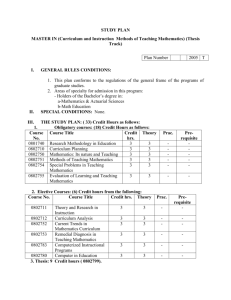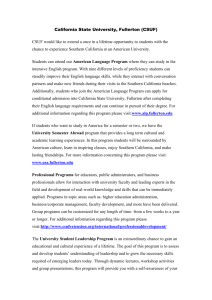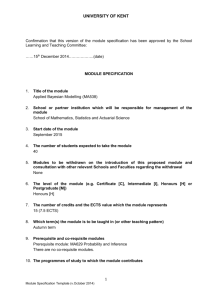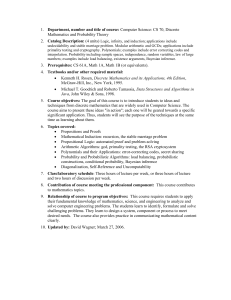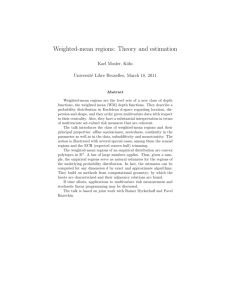PDF brochure - Department of Mathematics
advertisement
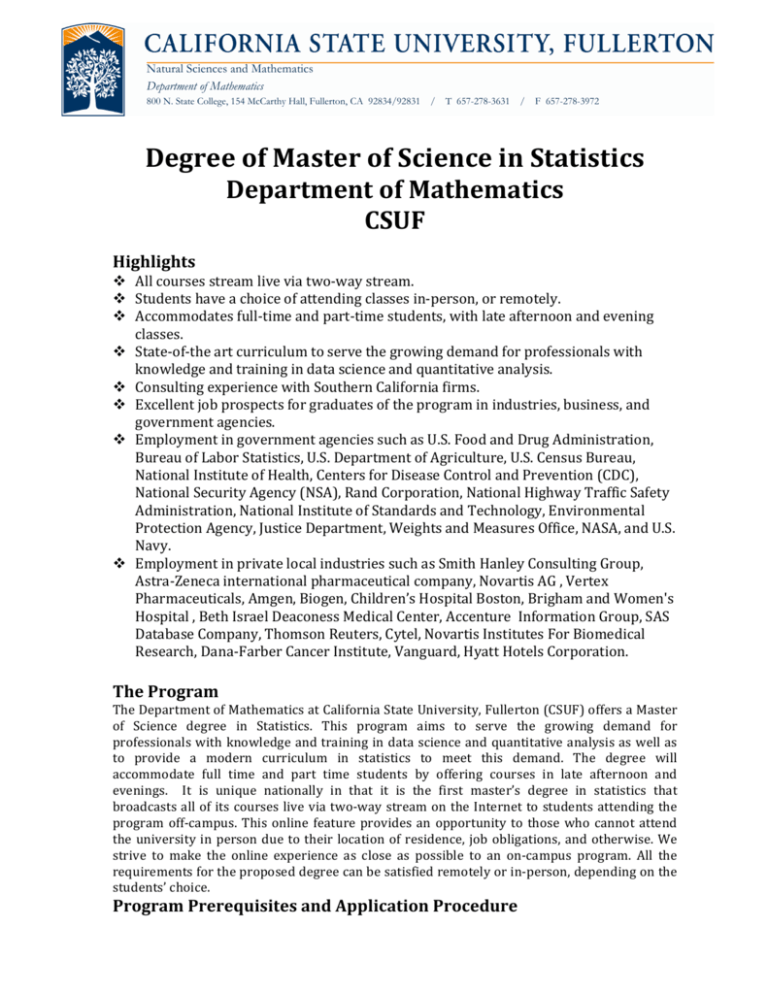
Natural Sciences and Mathematics Department of Mathematics 800 N. State College, 154 McCarthy Hall, Fullerton, CA 92834/92831 / T 657-278-3631 / F 657-278-3972 Degree of Master of Science in Statistics Department of Mathematics CSUF Highlights v All courses stream live via two-­‐way stream. v Students have a choice of attending classes in-­‐person, or remotely. v Accommodates full-­‐time and part-­‐time students, with late afternoon and evening classes. v State-­‐of-­‐the art curriculum to serve the growing demand for professionals with knowledge and training in data science and quantitative analysis. v Consulting experience with Southern California firms. v Excellent job prospects for graduates of the program in industries, business, and government agencies. v Employment in government agencies such as U.S. Food and Drug Administration, Bureau of Labor Statistics, U.S. Department of Agriculture, U.S. Census Bureau, National Institute of Health, Centers for Disease Control and Prevention (CDC), National Security Agency (NSA), Rand Corporation, National Highway Traffic Safety Administration, National Institute of Standards and Technology, Environmental Protection Agency, Justice Department, Weights and Measures Office, NASA, and U.S. Navy. v Employment in private local industries such as Smith Hanley Consulting Group, Astra-­‐Zeneca international pharmaceutical company, Novartis AG , Vertex Pharmaceuticals, Amgen, Biogen, Children’s Hospital Boston, Brigham and Women's Hospital , Beth Israel Deaconess Medical Center, Accenture Information Group, SAS Database Company, Thomson Reuters, Cytel, Novartis Institutes For Biomedical Research, Dana-­‐Farber Cancer Institute, Vanguard, Hyatt Hotels Corporation. The Program The Department of Mathematics at California State University, Fullerton (CSUF) offers a Master of Science degree in Statistics. This program aims to serve the growing demand for professionals with knowledge and training in data science and quantitative analysis as well as to provide a modern curriculum in statistics to meet this demand. The degree will accommodate full time and part time students by offering courses in late afternoon and evenings. It is unique nationally in that it is the first master’s degree in statistics that broadcasts all of its courses live via two-­‐way stream on the Internet to students attending the program off-­‐campus. This online feature provides an opportunity to those who cannot attend the university in person due to their location of residence, job obligations, and otherwise. We strive to make the online experience as close as possible to an on-­‐campus program. All the requirements for the proposed degree can be satisfied remotely or in-­‐person, depending on the students’ choice. Program Prerequisites and Application Procedure Students must have a bachelor’s degree, and have had courses in mathematics and statistics. Specifically the following courses are prerequisite for the program: two years of calculus sequence including linear algebra (Math 150AB and Math 250AB, or equivalent), probability theory (Math 335, or equivalent), an upper-­‐division statistical methods course (Math 338, or equivalent), and a computer programming course (one of Math 320, CSC 120, or CSC 121 or equivalent). Upper division prerequisite courses must be completed with a grade of B or better. Students who do not satisfy these prerequisites may be considered for conditional admission. Students can apply online at http://www.csumentor.edu and have official transcripts sent to CSUF’s Admissions and Records. GRE scores and letters of recommendation are not required, however, names and contact information for three references must be provided. International students should refer to the following site for further information and requirements: http://www.fullerton.edu/admissions/ProspectiveStudent/International.asp. Program Requirements The program offer state-­‐of-­‐the-­‐art technology oriented curriculum to meet the evolving needs of business, industries, and government agencies. The program also provides the necessary training to those students whose ultimate goal is to receive a Ph.D. degree in statistics. The degree requirements are as follows: A total of 30 units is required for the degree: Required courses Math 502AB Math 531T Math 534 Math 535 Math 537 Math 536 Math 538 Math 539 Probability and Statistics I & II Special topics Statistical Computing Applied Biostatistics Multivariate Analysis Categorical Data Analysis Bayesian Statistics Statistical Consulting 6 Units 6 Units 3 Units 3 Units 3 Units 3 Units 3 Units 3 Units Elective Courses Students are required to take six units of courses most suited to their educational objectives. These courses must be approved by the Statistics Graduate Committee. The department offers special topics courses Math 531T to filfill this requirement. Students can request to write a master’s thesis. If this request is approved by the Statistics Graduate Committee, then six units of thesis course work will be counted as the required elective units. Capstone Event All students must pass a comprehensive examination that is administered in spring semester of the second year to assess students’ knowledge of statistical theory and applications, critical and independent thinking, communication skills, and mastery in application of their knowledge to problem-­‐solving. With the approval of the graduate statistics committee, students may write a master’s thesis in lieu of the comprehensive examination. A master's thesis should reveal the candidate’s ability to work in a scholarly manner and is acquainted with the principal works published on the subject of the thesis. As far as possible it should be an original contribution. The thesis is to be completed under the supervision of a Mathematics Department faculty. Roadmap The following table shows an example of a roadmap for the required courses for students planning to take six units of courses per semester: Fall of first year Math 502AB: Mathematical Probability and Statistics (6 units) Spring of first year Math 534: Statistical Computing (3 units) Math 535: Applied Biostatistics (3 units) Summer of first year Math 531T (6 units) or Math 598: Thesis, or two elective courses (6 units) Fall second year Math 536: Categorical Data Analysis (3 units) Math 537: Multivariate Analysis (3 units) Spring second year Math 538: Bayesian Analysis (3 units) Math 539: Statistical Consulting (3 units) Comprehensive Exam Financial Support Qualified students can apply for a position of Teaching Associate. For more information on how to apply for a Teaching associate position, please contact the Mathematics Department at (657) 278-­‐3631. Depending on availability of funds, a limited number of non-­‐resident fee waivers are also available on competitive basis for non-­‐resident students. Catalog descriptions of the required courses Math 502AB – Probability and Statistics I & II 502A: Prerequisite: Math 335. Corequisite: Math 502B. Theory and applications of probability models including univariate and multivariate distributions, expectations, and transformations of random variables. 502B: Math 335. Corequisite: Math 502A. Theory and applications of sampling theory, statistical estimation, and hypothesis testing. Math 534 – Statistical Computing Prerequisite: Math 502AB, Math 320 or equivalent, Linear Algebra Numerical methods in linear and nonlinear regression including Gauss-­‐Jordan, QR, and Gauss-­‐ Newton algorithms, maximum likelihood computation, including Newton, Fisher-­‐scoring, quasi-­‐Newton, and EM algorithms, Bayesian computations, including numerical integration, Monte-­‐Carlo integration, and Markov chain Monte Carlo, and nonparametric inference including Bootstrap. Math 535 – Applied Biostatistics Prerequisite: Math 502AB Analysis of survival data using parametric, nonparametric, semi-­‐parametric methods, censoring and truncation, survival/hazard functions, parametric models, life-­‐tables, Kaplan-­‐Meier and Nelson-­‐Aalen estimators, log-­‐rank test, Cox proportional hazards models, partial likelihood, time-­‐dependent covariates, additive hazards models, diagnostics, and competing risks. Math 537 – Multivariate Analysis Prerequisite: Math 502AB, Linear Algebra Multivariate normal distribution, comparison of several multivariate means, multivariate linear regression models, elliptically contoured distributions, estimation of orthogonal and oblique factors, inference for structured covariance matrices, simultaneous equation models, classification functions, procrustes analysis, and graphical models. Math 536 – Categorical Data Analysis Prerequisite: Math 502AB Inference for two-­‐way contingency tables, generalized linear models, logistic regression, logit and probit models, log-­‐linear models, model fitting and estimation of loglinear parameters, strategies in model selection, log linear models for ordinal variables, Poisson regression, and Poisson loglinear models. Math 538 – Bayesian Statistics Prerequisite: Math 502AB, Math 534 Fundamentals of Bayesian inference including informative and non-­‐informative priors for single and multi parameter models, Bayesian asymptotic, hierarchical models, Metropolis Hastings and Gibbs sampler algorithms, model checking, Bayesian design of experiments, Bayesian linear models and generalized linear models, and neural networks. Math 539 – Statistical Consulting Prerequisite: Math 502AB Ethics, communication aspects of consulting with clients, formulation of statistical problems, recommendations of design protocols, selection of appropriate statistical methods, data analysis, and interpretation of results including writing proper reports. The course will utilize case studies. Contacts For administrative questions please contact Jan Sheridan at 657-­‐278-­‐3631 (jsheridan@fullerton.edu). For questions about curriculum and prerequisites, please contact the Statistics Graduate Advisor, Professor Mori Jamshidian 657-­‐278-­‐2398 (mori@fullerton.edu).

